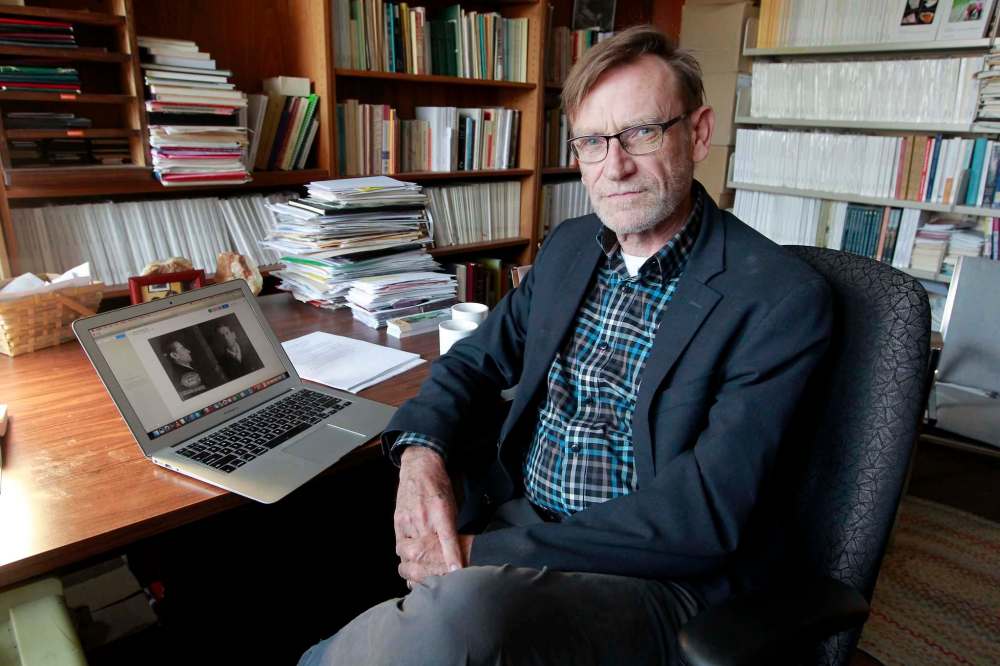U of W fellowship will help fund research of KGB files on Mennonites who vanished during Stalin’s Ukraine purges
Advertisement
Read this article for free:
or
Already have an account? Log in here »
To continue reading, please subscribe:
Monthly Digital Subscription
$0 for the first 4 weeks*
- Enjoy unlimited reading on winnipegfreepress.com
- Read the E-Edition, our digital replica newspaper
- Access News Break, our award-winning app
- Play interactive puzzles
*No charge for 4 weeks then price increases to the regular rate of $19.00 plus GST every four weeks. Offer available to new and qualified returning subscribers only. Cancel any time.
Monthly Digital Subscription
$4.75/week*
- Enjoy unlimited reading on winnipegfreepress.com
- Read the E-Edition, our digital replica newspaper
- Access News Break, our award-winning app
- Play interactive puzzles
*Billed as $19 plus GST every four weeks. Cancel any time.
To continue reading, please subscribe:
Add Free Press access to your Brandon Sun subscription for only an additional
$1 for the first 4 weeks*
*Your next subscription payment will increase by $1.00 and you will be charged $16.99 plus GST for four weeks. After four weeks, your payment will increase to $23.99 plus GST every four weeks.
Read unlimited articles for free today:
or
Already have an account? Log in here »
Hey there, time traveller!
This article was published 27/02/2018 (2805 days ago), so information in it may no longer be current.
Large black vans, dubbed “ravens” by Mennonite people because they were such an ominous sign, would pull into their villages in Ukraine.
This was in the mid-1930s during Soviet leader Josef Stalin’s purges. There were very few cars at that time, so the KGB vehicles stood out.
The KGB agents got out, banged on doors in the dead of night, and arrested fathers and grown sons on the pretence of treason.

Most of the men were never seen again. More than 80 per cent were executed within six months and many within 48 hours. More than 30,000 Mennonites would perish at the hands of the Soviet Union government from 1927 to 1947, out of a population that never exceeded 100,000.
The KGB archives of those missing persons are now being made available to scholars by the Ukrainian government, perhaps as a snub to Russia. A fellowship has been created, thanks to $450,000 in donations to help fund research of those archives through the Centre For Transnational Mennonite Studies at University of Winnipeg.
“This is still a big hidden chapter in Mennonite history,” said Royden Loewen, chair of Mennonite Studies at U of W.
Many Mennonite families have never been told what happened to direct relatives who were lost in that period in the former Soviet Union.
“Mennonites have had their moments of horror. One of those was in the 16th century when 4,000 Mennonites were burned at the stake. But this is the second great atrocity in Mennonite history,” Loewen said.
The people were arrested and sent “to some kind of kangaroo court” on false charges, and summarily executed, he said.
However, the KGB were great record-keepers. (The KGB was called the NKVD at the time, one of several name changes for the secret police.) The KGB had more than 40,000 employees in Ukraine alone, said Peter Letkemann, an independent scholar in Mennonite studies.
“They had arrest officers, torturers, prison guards, prosecutors, and hundreds of secretaries typing out all of these interrogations with prisoners,” said Letkemann.
Dossiers were kept on each person and include a mug shot-like photo of the arrested person, with a front and side view. Documents would also list the charges, a transcript of the interrogation, where the person was executed and buried. The dossier might also include the identity of an accuser.
“The dossiers are one-and-a-half to two inches thick for each individual,” said Letkemann.
The $450,000 raised is part of the fundraising goal of $3 million to start a professorship in Russian Mennonite History. The fellowship will assist other Russian Mennonite research but the KGB archives are a priority right now.
The KGB archives were opened up briefly from 1989 to 1991 until Russian President Vladimir Putin had them closed again, Loewen said.
“Now we can send experts in and examine the records systematically, learn about patterns of arrest, why people were arrested, patterns of tortures, and get a much better understanding of what happened,” he said.
The fellowship is considering sending a small team to Ukraine to study the archives but money could also be used to fund research by scholars already there. The Mennonite Studies department already is acquainted with scholars in Ukraine and hope to collaborate with them.
The fellowship is called the Paul Toews Fellowship in Russian Mennonite History. Paul Toews was professor of Mennonite and U.S. History at Fresno Pacific University in California, and an active participant in the Mennonite Studies program at U of W.
The Centre for Transnational Mennonite Studies facilitates the study of relations among Mennonites spread around the world.
bill.redekop@freepress.mb.ca

